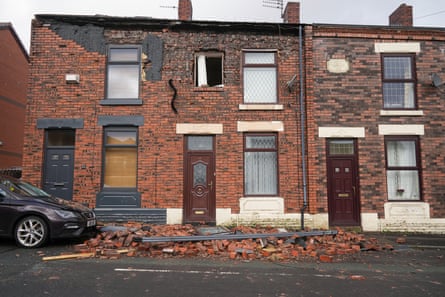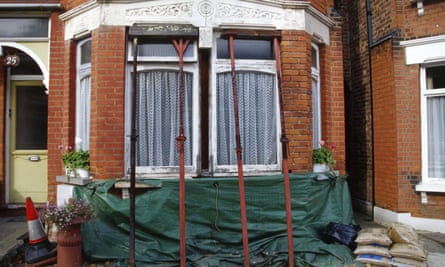
Record temperatures, flash floods, storms – the UK’s weather is becoming more extreme, and it is having an impact on our homes. Last summer’s heatwave caused subsidence cases to triple at one major insurer, and experts say that the damage wrought by wild weather could mean we all end up paying more for home insurance.
Data from Halifax Home Insurance shared with Observer Cash gives an insight into the effect of the hot weather on UK homes. The number of subsidence cases it received in August and September last year was three times the typical monthly average, while across 2022 it received 45% more claims than the previous year.
A major cause of subsidence is dry weather. During a dry spell such as last year’s drought, houses built on clay-rich soil suffer as the moisture is sucked away by trees and bushes. This causes the clay to shrink and foundations to drop, causing structural problems.
In one case settled by Halifax, the insurer paid out more than £365,000 for repairs, underlining how much damage can be done. “We have seen a direct impact of the unusually high temperatures of last summer,” says Tim Downes, a Halifax home insurance claims expert. “The impact of climate change on severity and frequency of weather events such as extreme heat, storms and flooding is unquestionable.”
Across the industry, the Association of British Insurers (ABI) says firms expected to pay out £219m for subsidence claims made last year – the highest bill since 2006 when parts of the UK also experienced a drought.
Of the 23,000 subsidence claims made during 2022, 18,000 came in the second half of the year, after the summer heatwave.
 View image in fullscreenA house and car in Ashton-under-Lyne that were damaged by Storm Franklin in February last year. Photograph: Christopher Furlong/Getty Images
View image in fullscreenA house and car in Ashton-under-Lyne that were damaged by Storm Franklin in February last year. Photograph: Christopher Furlong/Getty Images
These were part of a blizzard of weather-related claims, the ABI says. Storms Dudley, Eunice, and Franklin in February led to 170,000 claims for property damage, while the cold snap in December led to a surge in claims related to burst pipes.
Inside the house, extreme weather is leading to an increase in claims on contents policies. Recently, Tesco Bank said it had seen a spike in the, albeit very small, number of claims involving broken freezers as a result of the heatwave this June.
The bank said the hot weather meant compressors had to work overtime and some were giving up as a result, causing food to spoil.
The ABI says it cannot comment on what impact climate change will have on future premiums.
However, Matthew Harwood, a home insurance expert at the comparison website Confused.com, says it is likely to be a factor in rising prices.
“As weather conditions continue to be more extreme in the UK, it’s likely more people will be making claims for damage to their property or possessions,” says Harwood.
He says that the cost of living crisis means people are more likely to turn to their insurance policy to cover costs rather than paying for it themselves, even in the case of smaller claims.
“Because of this, prices could increase as insurers have to adjust their pricing to account for the increase in claims. And this is not just because of the frequency of claims, but the cost of claims too. Everything is becoming more expensive, so repairs and replacements are likely to cost insurers more to cover.”
David Joyson, the chief customer officer at the insurance provider Homeprotect, says extreme weather is “definitely a key factor” in rising premiums. He points to the growing number of related claims and says “if your area has more properties prone to these issues, your home can be seen as more of a risk to insure, so even if you haven’t been directly affected, your premium will likely be higher”.
The warning comes at a time when premiums are already increasing – the average price paid for combined home buildings and contents insurance in the first three months of this year was £315, up 6% on the same time in 2022, according to ABI figures.
But if you do need to claim the price could seem well worth it: research from Confused.com puts the average claim for storm damage at £3,334 for contents insurance and £3,108 for buildings insurance.
 View image in fullscreenHouseholders should act as soon as they see any signs of subsidence. Photograph: EDIFICE/Alamy
View image in fullscreenHouseholders should act as soon as they see any signs of subsidence. Photograph: EDIFICE/Alamy
“Last year’s storms and record-breaking temperatures were a dramatic reminder of the importance of home insurance, with insurers paying out £473m to support customers affected by storms Dudley, Eunice and Franklin, and expecting to pay £219m in subsidence claims,” says an ABI spokesperson.
“We would always recommend shopping around when looking for insurance but be sure to get the policy that meets your needs, not just based on price.”
Halifax’s Downes says subsidence claims can often be easily fixed. But he says homeowners should contact their insurer “as soon as they spot any sudden cracks over 3mm in the plaster at home or in outside brickwork, doors or windows sticking out of the blue, wallpaper ripping or any new sloping or dipping of ground floors”.
Anyone whose home has been affected by extreme weather is advised to contact their insurer as soon as possible and inspect their property thoroughly for damage, keeping affected items so they can be examined.
“In some situations you may need to sort out emergency repairs so you must let your insurer know about them and keep all receipts and invoices. These should then be able to be added to your claim,” says Harwood.

